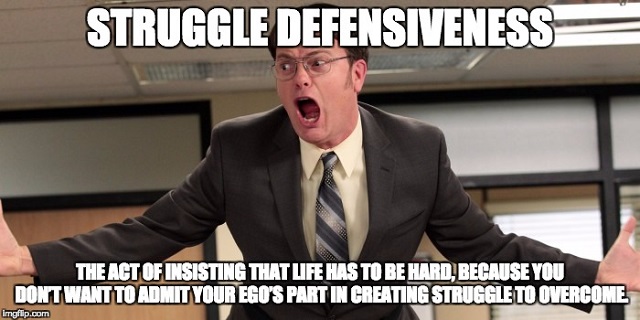Have you ever said something like this?
“My fear of gaining weight keeps me motivated to exercise.”
“The guilt I feel about not having accomplished enough keeps me going.”
“The shame I have about not being in a relationship keeps me looking for the right person.”
“My jealousy makes me work harder.”
As a life coach, I hear these beliefs all the freakin’ time from clients when we first start working together.
What they’re really saying is:
It is necessary for me to be upset with my current conditions in order for me to be motivated to create what I want.
Dissatisfaction and negative self talk are necessary for motivation.
Fear is the best creative force.
I call it “struggle defensiveness”—the act of insisting that life has to be hard, because you don’t want to admit your ego’s part in creating struggle to overcome.

I cringe when I hear these beliefs, because I know that they keep people creating from a low-level frequency.
I wish I could stick a straw into collective consciousness, suck out all of that fear-based programming, and replace it with these beliefs:
The more joyful I am, the more effective I am.
Dissatisfaction doesn’t motivate me as much as gratitude and inspiration.
I do not need to feel guilty for experiencing ease.
I do not need to be afraid that being too content will lead to stagnation.
According to Esther Hicks (I’m not so sure about the “channeling entities” thing, but most of what she says is dope), emotions are an indication of your vibration.
From higher vibration to lower vibration, emotions go something like this:
Joy and love
Happiness
Optimism
Worry
Anger
Jealousy
Guilt
Insecurity
Shame
Fear
As we go up the scale, we come into greater and greater alignment with who we really are. This greater alignment leads to greater ease in bringing our intentions into reality.
The higher emotional state you reside in, the less force you need to use in order to accomplish what you want.
Yes, anger, insecurity, jealousy, and guilt are motivating in the sense that going from guilt to anger, for example, would be a step up. However, just because anger is more motivating than guilt doesn’t mean that anger is inherently motivating. It is still much less motivating than happiness.
So, while it may be necessary for us to move through these lower-level emotions, we often start believing that we have to stay there. We become attached to these emotions, because we think they help us to be productive.
We’ve falsely correlated shame, fear, guilt, jealousy, anger, and worry with the ability to create what we want, because we have been taught to believe that joy, love, happiness, and optimism are naive and inherently unproductive. We have been taught to equate “hard work” with our value as a person.
Really, joy and love amplify the rate at which we can manifest, while lowering the effort required. Trying to create from low-level emotions is like turning the treadmill incline all the way up, making it so much harder for ourselves.
But, the ego loves creating a struggle, so that it has something to overcome and use to validate itself. So, it tells us that we have to channel insecurity, anger, guilt, and shame in order to have the discipline to do the hard work of creating better circumstances. It tells us that joy, happiness, and optimism will be inversely correlated to our ability to produce better results.
It’s like believing that we have to kick the dog in order to get her to behave. This belief keeps us magnetized toward these low-level emotions and prevents us from moving up the emotional scale. So, we need to redefine the way we think about discipline.
When we usually think about discipline, we call to mind some degree of masochistic self-punishment. But really, discipline comes from the root word “disciple”—to be lovingly devoted to something. When you are connected to your source of inspiration, you will be endlessly devoted to your commitments.
You will find your wellspring of love—the source of all effective action—and will never run out of fuel. All you need to keep you going is a beautiful vision for the world that you are authentically inspired by. Here’s a quick coaching on how to follow your heart:
If a commitment hasn’t come out of love, then it’s not a commitment—it’s an ego desire. It’s something your ego thinks you need in order to be validated.
Every authentic commitment boils down to this: wanting to love, be loved, or expand another’s capacity to love. And, love can’t come from anything but love.
So, we need to remind ourselves that shame does not lead to happiness. Fear does not lead to abundance. Guilt does not lead to acceptance. Dissatisfaction does not lead to motivation.
We need to give up the notion that we need to stay upset in order to stay focused.
We need to remind ourselves that there is a world of a difference between “my life is wrong, and I have to fix it!” and “my life is already wonderful, and I also desire to create new circumstances because I love creating.”
Repeat after me: it is never necessary for me to be upset with myself or where I’m at in order for me to be motivated to create what I want.
Completely give up the idea that the harder you are on yourself, the better results you will produce. Find a vision for the world that inspires you—and then, live in alignment with that.
No negative self-talk necessary. No shame. No self judgements. No self-inflicted punishments.
Just a loving vision for the world.
~
Relephant:
The Vulnerability of our Desires: how to Stop Sabotaging our own Goals. {Video}
How to be Abundant when all you See is Scarcity.
~
Author: Brandilyn Tebo
Images: Unsplash; author’s meme
Editor: Yoli Ramazzina
Copy Editor: Travis May
Social Editor: Waylon Lewis


 Share on bsky
Share on bsky





Read 0 comments and reply